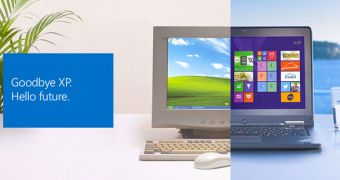Microsoft will officially deliver the last batch of updates for Windows XP today, but starting tomorrow, the operating system launched nearly 13 years ago will remain vulnerable to attacks. Microsoft will no longer fix bugs in its old platform, so every time hackers will find new security issues in Windows XP, the company won’t be there to protect you.
In a new tweet posted today, the software giant warns that “not upgrading could put your business at risk,” so you can get protected right now by upgrading to a new OS version.
“After 13 years of loyal service, support for Windows XP and Office 2003 officially ended on 8 April 2014. And while PCs running XP still work, we're no longer offering technical support, seeding security patches, pushing bug fixes or developing service packs,” Microsoft said on a page whose tagline is “Goodbye XP. Hello future.”
“Find out what the end of Windows XP support means to your company, what your options are and how a switch to today's tools and devices can place your business on the front foot for tomorrow.”
Windows XP is still installed on 28 percent of computers worldwide, which is just another sign that Microsoft won’t be able to kill the operating system today. Instead, plenty of users will continue to run Windows XP, so it’s very important to take some steps to protect your computer and make sure that you won’t get hacked when new vulnerabilities are found.
Microsoft is also removing Security Essentials for Windows XP download links, so you’ll have to find another anti-virus protect to keep your computers running XP fully protected. The good thing is that plenty of security vendors across the world have already confirmed extended Windows XP support for their apps, so it shouldn’t be too difficult to find an anti-virus product that still works on this old OS version.
And even though security apps will remain compatible with XP, Microsoft warns that this won’t be enough because exploits trying to take advantage of OS vulnerabilities might not be entirely blocked by third-party software.
Users, however, are refusing to upgrade for a number of reasons, with some pointing to the high costs of the migration as the main reason, while others prefer to wait until Windows 9 comes out in order to finally purchase a new computer running a modern operating system. It remains to be seen how many users will move from XP in the coming months.

 14 DAY TRIAL //
14 DAY TRIAL //